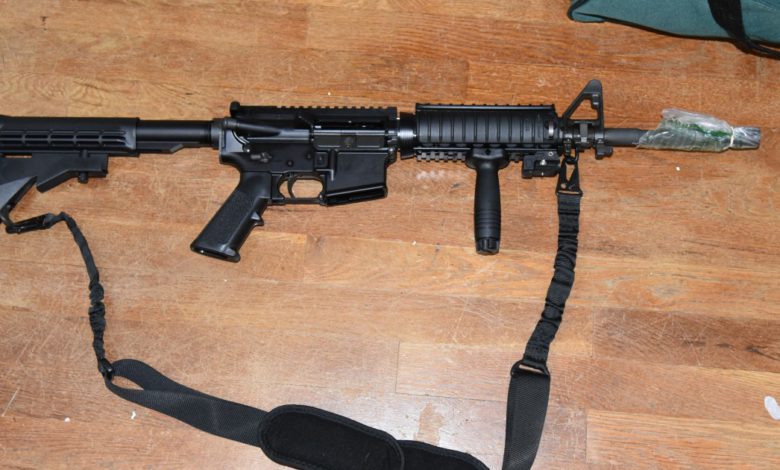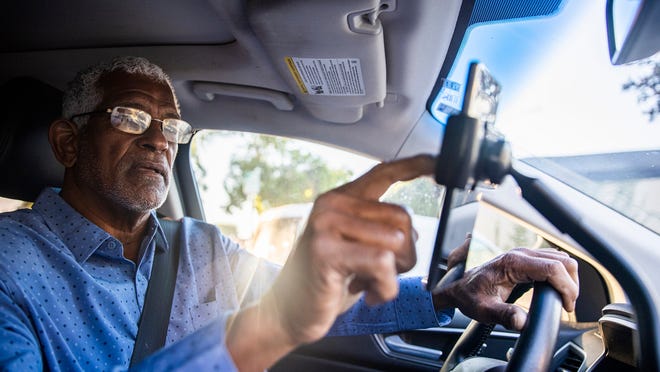
BLUE ASH — Blue Ash officers executing a search warrant in August 2020 found a semi-automatic rifle and 1,800 rounds of ammunition in the bedroom of Robert "Bo" Weber, a man on parole for a gun-related crime.
Weber's felony conviction made it a crime for him to possess a firearm.
According to a Blue Ash police affidavit, someone admitted purchasing the gun for Weber, but the buyer wasn't charged.
A 2018 General Accounting Office report found people caught lying on federal firearms purchase forms are rarely charged, even though that's a felony.
The I-Team's review of federal cases also found that when so-called 'straw-purchasers' of firearms are charged, it's usually because the gun was used in a violent crime or was part of a larger criminal conspiracy.
Straw-purchasers are often friends or relatives of the people getting the guns, according to Bureau of Justice Statistics surveys of felons charged with gun possession.
The I-Team interviewed the person who told police she bought the rifle for Weber.
WCPO isn't identifying her because she hasn't been charged.
Blue Ash Police Department
Weber, now 28, was convicted of a felony for illegally possessing a firearm. He's serving a two-year prison sentence.
"I think you have to have public officials take this more seriously," said Dr. Daniel W. Webster, Director of the Johns Hopkins Center for Gun Policy and Research in Baltimore. "Cracking down and sending a message on illegal straw-purchasers is really central, in my opinion, to ultimately having long-term sustainable reductions in gun violence."

Zoom interview screenshot
The GAO report said there were 112,000 firearms transactions denied in fiscal year 2017 because of false information on federal firearms purchase forms.
That resulted in 12,700 cases investigated by Alcohol Tobacco and Firearms agents, according to the GAO report.
The GAO report found, "U.S. Attorney's Offices had prosecuted 12 of these cases as of June 2018."
"Where we can prove the elements beyond a reasonable doubt, we're taking those cases," said Vipal Patel, Acting United States Attorney for the Southern District of Ohio since last March.

Zoom screenshot
Patel, First Assistant U.S. Attorney since April 2016, declined to comment on the Blue Ash case.
"The Blue Ash Police Department considers this a successful resolution to this case," said Blue Ash Police Chief Scott Noel in an email response to the I-Team's questions about the case against Bo Weber and the gun buyer's role in it. "To avoid jeopardizing future cases, I will not discuss specific investigative or tactical techniques used by the Blue Ash Police Department."
The I-Team emailed two requests to the office of Hamilton County Prosecutor Joe Deters requesting comment, but his office has not provided one.
Former United States Attorney Ben Glassman reviewed the Blue Ash police records at the I-Team's request.

Michael Benedic
"The facts that you've shared with me - in my mind - warrant an investigation at the conclusion of which a charging decision should be made," said Glassman who is now a partner with the law firm Squire Patton Boggs. "The point of federal law prohibiting people from owning firearms is to make sure firearms stay out of the wrong hands."
Patel said federal prosecutors have charged individuals with lying on federal firearms forms and will continue to do so if the case warrants it.
"The principle here is to make sure the federal government's resources are expended wisely," Patel said. And "that justice is being served in an appropriate fashion."
Local gun 'straw buyer' cases
In recent years, federal prosecutors have charged several local individuals with lying on firearms purchase forms.
One of the most high-profile cases followed the 2019 mass murder in Dayton's popular Oregon District.
Connor Betts opened fire on dozens of people, killing 9 and wounded 17 before police shot and killed him.
The U.S. Attorney's Office charged Betts' friend, Ethan Kollie, with providing false information on a firearms purchase form.
Kollie bought firearms parts for the semi-automatic rifle Betts used, according to the U.S. Attorney's Office.
In February 2020, a federal judge sentenced Kollie to 32 months in prison. He's scheduled to be released in June 2022.

Paola Suro
Three months after the Dayton mass murder, DEA Task Force Officer Jorge Del Rio was shot and killed during a raid at a Dayton home.
According to a DEA affidavit, Nathan Goddard told investigators he shot Del Rio because he thought the officer broke into his house to rob him.
A federal grand jury indicted Goddard for killing Del Rio and for possession and intent to distribute fentanyl, cocaine and marijuana.
Federal agents found three weapons in the home, including the one used to kill Del Rio, according to federal prosecutors.
Investigators traced the weapons back to a Trenton man, Delano Wells, who purchased the firearms for Arland Mills, also from Trenton.
Mills pleaded guilty to hiring Wells to illegally buy firearms for him.
Wells pleaded guilty to lying on the firearms purchase forms.
Last month, a federal judge sentenced Wells to time served with three years supervised release, the first six months on home detention.
The U.S. Attorney's Office also prosecuted a Columbus man for providing false information on firearms purchase forms he used to buy weapons for a gun smuggling operation.
In nearly all cases the I-Team found where federal prosecutors in Ohio, Indiana and Kentucky had charged someone with providing false information when buying a gun, there were additional serious crimes involved later by people who used the straw-purchased guns, including trafficking of guns and drugs, and murder.
However, in 2018, the U.S. Attorney's Office for the Northern District of Ohio charged a man with a felony for giving his father a handgun.
Rodney McMeans, Jr. pleaded guilty to transferring the firearm to his father, Rodney McMeans, who was prohibited from possessing a gun because of his violent criminal history, which included convictions for attempted aggravated murder, kidnapping and rape.
McMeans Sr. was not accused of committing more crimes with the gun his son gave him.
In July 2019, a federal judge sentenced McMeans Jr. to three years probation. His father received a sentence of 37 months in prison.
Cincinnati's crackdown on illegal guns
In Cincinnati, a Gun Crime Task Force is focusing on getting illegal guns off the streets and prosecuting the convicted felons who possessed those firearms in violation of state and federal law.
The task force includes a special unit of Cincinnati officers.
A prosecutor from both the Hamilton County Prosecuting Attorney's Office and the City of Cincinnati Law Department join federal prosecutors on the task force.
So far, the U.S. Attorney's Office has announced criminal charges against 52 individuals.
There have not been charges announced against people who provided those guns to the defendants.

Cincinnati Police Department
"We're focusing the limited resources of the federal government on the where we can have the biggest impact," Patel said.
That means "targeted enforcement," Patel said, not blanket prosecutions of everyone who lied on a federal firearm purchasing form.
"There have been actions, there will be actions" brought against straw gun purchasers, Patel said.
The Cincinnati Police Department is focusing more time, effort and resources into gun-related investigations.
CPD plans to move their Crime Gun Intelligence Center into a new building in October.
It will be the first facility of its kind in Ohio and will help investigators more effectively trace a firearm's history, according to CPD.







